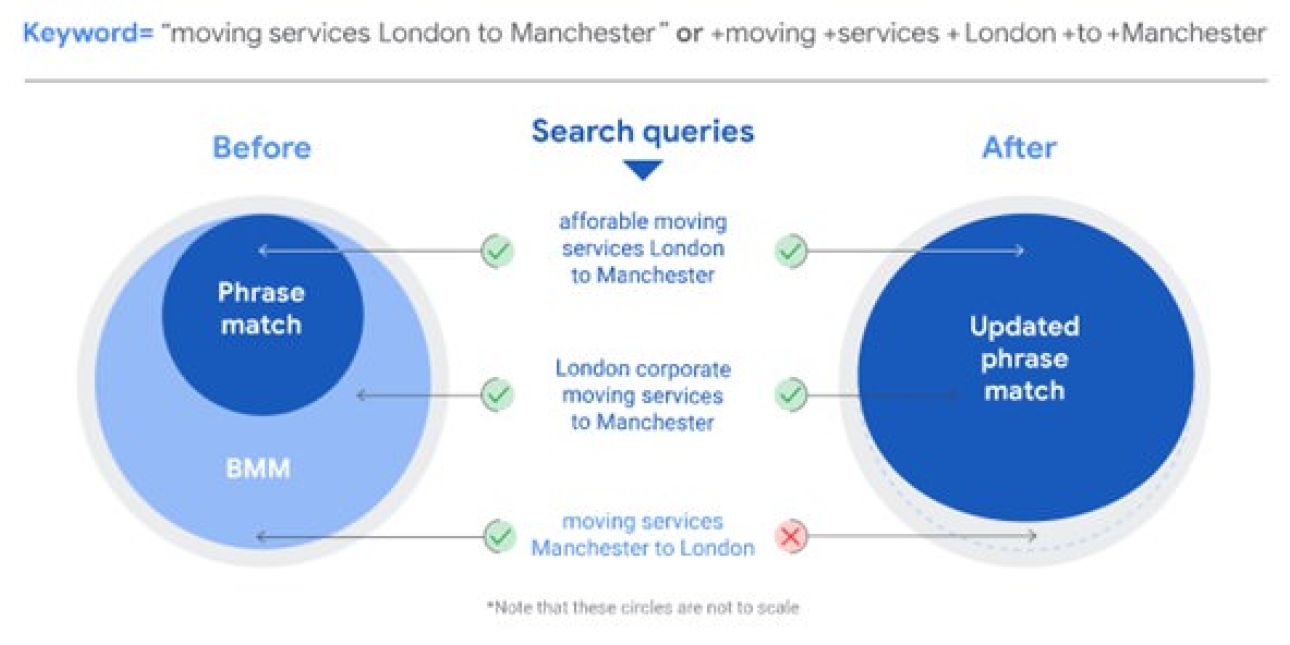PUBLIC RELATIONS
Tuesday 9th March 2021
How Google’s phrase and BMM update will affect your PPC strategy
In February, Google announced some changes to the way they will match search queries to ads. For businesses that utilise Google Ads – formerly known as Google AdWords – to promote themselves to customers, this is likely to impact your PPC (pay-per-click) strategy.
These changes specifically focus on the Keyword Match Types, which are the systems that Google uses to dictate how closely your ad keywords need to match with users’ search terms to deliver certain ads. Previously, the match types were:
- Exact match
- Broad match
- Phrase match
- Broad match modifier (BMM)
However, the new updates, which are currently being rolled out and are due to be finalised in July 2021, mean that BMM is being phased out. By then, advertisers will no longer be able to create BMM keywords or edit existing ones. Instead, phrase match will expand to cover the functionality of BMM. According to Google, the aim of this move is to offer more control and better reach to advertisers. But like with any update, being willing to adapt your PPC strategy is key to making the most of these changes.

To help prepare for these developments, here are three key points that are likely to have the most impact on advertisers:
1: BMM will no longer be supported, but phrase match will change to cover search traffic that would originally have been picked up by BMM.
2: Like BMM used to, phrase match will now take notice of word order in search queries ‘when it’s important to the meaning’.
3: Google will no longer trigger ads for queries deemed inappropriate based on semantics, meaning that the new phrase match type will not trigger all the same queries it used to.
With these in mind, here are five tips to help you adapt your strategy:
1: Accustom yourself to the changes by looking at Google’s examples of keywords that will no longer trigger after the update.
2: Keep an eye on search term reports to monitor impact on relevancy whilst adding negative keywords into the accounts to ensure that click-through rate percentages remain strong.
3: Resist the temptation to move to a full broad match strategy as this can trigger search queries which are only loosely related to the keyword, resulting in the true meaning of the search being lost or misconstrued and ultimately wasting your budget on irrelevant ad placements.
4: Test out the update for yourself by running low volume A/B tests, with full broad match enabled, to measure the incremental impact of this match type against the new phrase match type.
5: Moving forward, it is best to build granular account structures, ensuring that longer-tailed keywords are built into the account, with different permutations of each phrase. This will minimise the impact of future updates.
Updates like this can sometimes be a cause of panic for advertisers, but there’s no reason to be alarmed. This isn’t the first time that Google has changed its keyword mechanisms and will by no means be the last.
Remaining responsive and adaptable is the key to making sure your PPC strategy continues to be the best value for your brand.
For more information on Google’s phrase match and BMM update, please visit Google's support page.
Sean Healy is head of PPC at Jaywing, an award-winning, data-powered integrated agency, home to over 350 of the best thinkers across creative, technology and data science.

